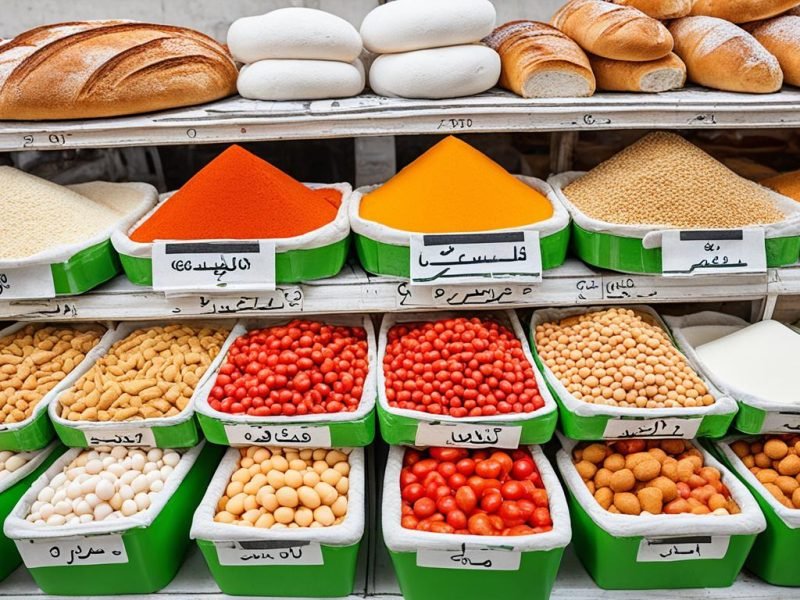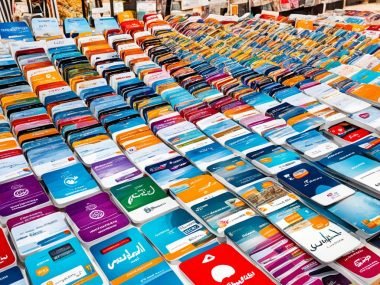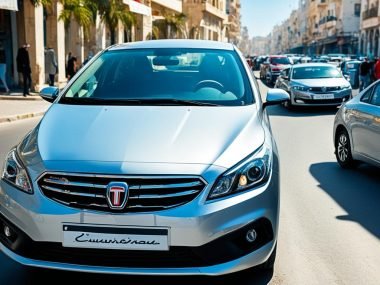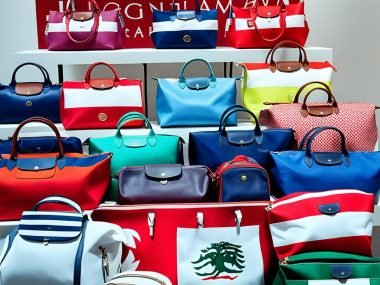Envision the busy lanes of a Tunisian market, with the smell of spices in the air. Colorful textiles add vibrancy to every corner. As you travel or think about moving to Tunisia, knowing the costs is exciting. In this guide, I’ll share my experience on living costs in Tunisia. You’ll learn how to budget for meals, shopping, housing, and getting around.
If you’re visiting for a short time or planning to stay longer, understanding the average prices in Tunisia is key. We’ll cover everything from taxi rides to having a traditional meal. This knowledge will help you spend wisely, making the most of your money. By the end, you’ll know how to budget well. You’ll also have a price list for Tunisia, helping you make smart money choices.
Key Takeaways
- Knowing the cost of living in Tunisia helps with planning trips or moving.
- Learning about average prices is essential for everyday budget management.
- A detailed expense overview prepares you for all types of costs.
- Effective budgeting tips ensure you use your money well.
- Access to a full price list guides you in spending wisely.
Introduction to Costs in Tunisia
Welcome to the exciting world of Tunisian economics! I’m eager to share some great tips with you. Let’s start with an introduction to Tunisian prices. This beautiful country lets you live well without spending too much. This is if you know the costs well.
Knowing what life costs here means knowing about the Tunisian Dinar (DT), our money. Exchange rates change and could affect your budget, especially if your cash is in another currency. This piece will compare costs in different areas. It will help you see what you might spend, based on where you live or visit.
To understand better, here’s a look at daily needs and their costs in various cities. You’ll see differences between city life and the more relaxed coastal or inland areas.
| Item | Tunis | Sousse | Tozeur |
|---|---|---|---|
| Bread (1 loaf) | 0.3 DT | 0.25 DT | 0.2 DT |
| Public Transport (Monthly Pass) | 40 DT | 25 DT | 20 DT |
| Basic Utilities (Monthly) | 180 DT | 120 DT | 100 DT |
| Apartment Rent (1-bedroom in City Center) | 600 DT | 400 DT | 300 DT |
As the table shows, living in Tunis is pricier than in Sousse or Tozeur. This is true for homes and utilities. Knowing these differences is key for budgeting well, depending on how you want to live.
I hope this gives you a good start to understanding costs in Tunisia. Knowing these cost basics will surely make your time here more fun and easier on your wallet. Whether you’re moving here or just visiting.
Eating Out: Restaurants and Street Food
As I explored Tunisia, I was struck by the variety of foods. From street vendors to cozy restaurants, there’s something for every budget. Tunisia offers delicious meals for any preference, making eating out a joy.
Typical Prices for a Meal at Local Eateries
Eating out in Tunisia can be affordable or a bit pricier depending on where you go. Street food, like ‘Brik’, is tasty and cheap, costing just a few Dinars. Yet, a local restaurant meal costs between 10 to 20 Dinars, offering a more complete experience without breaking the bank.
Cost Comparison: Mid-range vs. Inexpensive Restaurants
Comparing Tunisian restaurant prices reveals a clear difference. Smaller, family-run spots serve local dishes at low prices, from 5 to 15 Dinars for a meal. Meanwhile, mid-range restaurants, often near tourist areas, charge between 20 to 40 Dinars. Both provide a glimpse into Tunisia’s rich food culture beyond street food costs in Tunisia.
International Fast Food Chains: What to Expect to Pay
International fast food in Tunisia offers a taste of home, though at a higher price. Meals cost about 15 to 30 Dinars, more expensive than what you might be used to. Still, these places are liked for their quick service and familiar tastes.
Tunisia’s food scene has both great variety and value. Knowing about fast food prices in Tunisia helps travelers choose wisely. Whether in Tunis’s alleys or Sousse’s souks, you’ll find delicious choices that fit your budget.
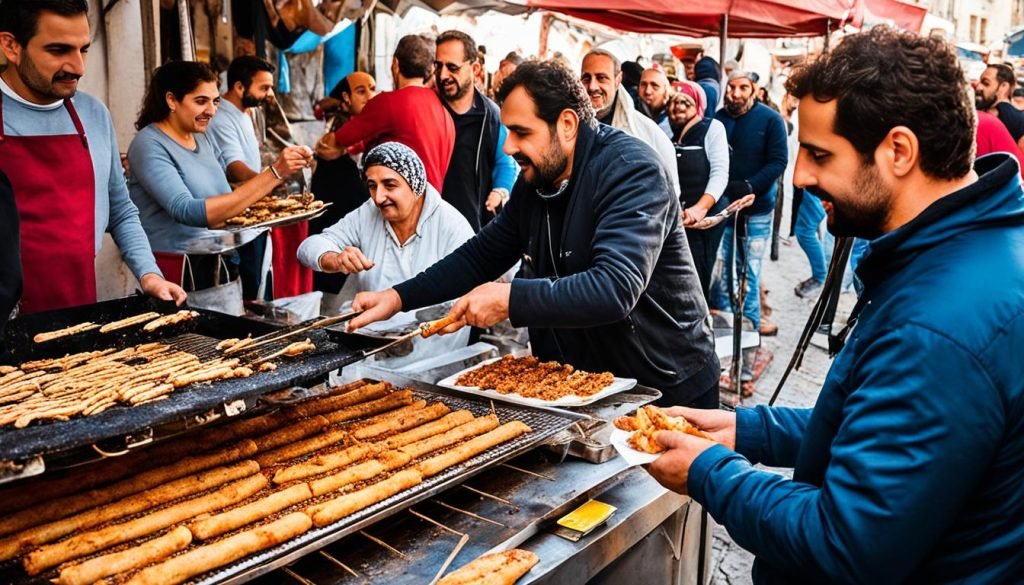
Grocery Shopping: Food Essentials and Local Delicacies
Tunisian grocery shopping offers a deep dive into local tastes and daily needs. This shows the true cost of food in Tunisia. When you visit a local market, you experience a feast for the senses. It’s where you see regional produce and special foods. Grocery prices for basics like bread, milk, and eggs are quite low. This lets you enjoy Tunisia’s flavors. At the same time, local treats make your meals even more exciting.
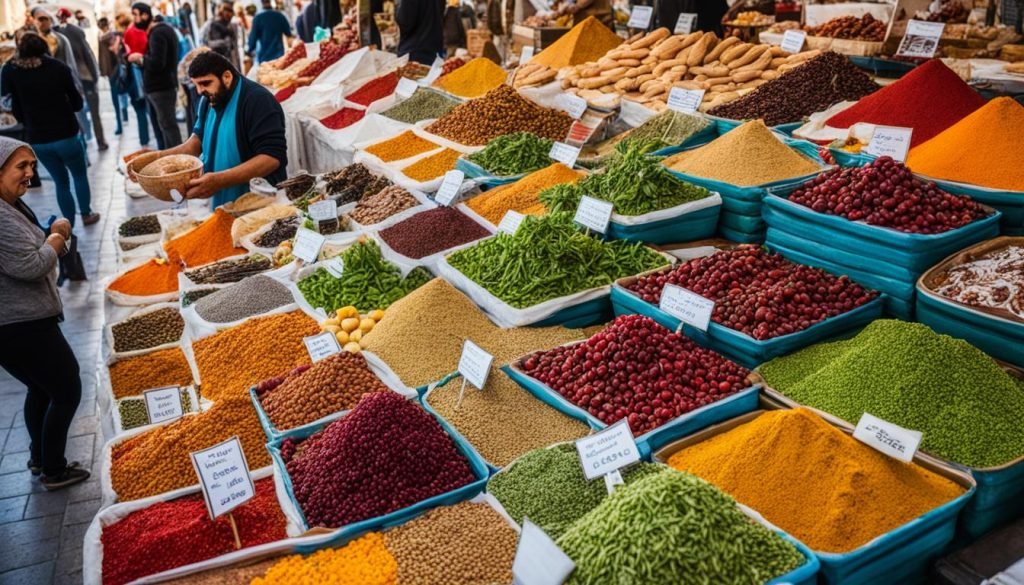
Staples: Bread, Milk, and Eggs
The cost of bread, milk, and eggs in Tunisia often amazes visitors because it’s so low. Bread is eaten with every meal, along with fresh local milk and eggs. Knowing these prices helps you keep track of your food budget. It also lets you enjoy the simple tastes of life in Tunisia.
Local Produce: Fruits and Vegetables
Local fruits and vegetables play a big role in Tunisian food. A trip to a market is vibrant and full of color. Here, prices show you what’s in season and how local farms are doing. This part of grocery shopping in Tunisia means you’re eating fresh. Plus, you’re supporting local farmers.
Meat and Poultry: Understanding the Market Rate
To get the best idea of meat and poultry prices in Tunisia, you need to visit different sellers. You’ll find beef, chicken, and sometimes lamb at butchers and stores. The prices change depending on where you are and the time of year. Keeping an eye on these changes helps you see the bigger picture of food costs in Tunisia.
| Item | Average Price (Tunisian Dinar) | Comments |
|---|---|---|
| Bread (1 loaf) | 0.350 | Staple food, widely available |
| Milk (1 liter) | 1.450 | Used daily by most households |
| Eggs (12) | 1.800 | Essential for breakfast and many recipes |
| Chicken (1 kg) | 7.50 | Common meat, varies by quality |
Getting Around: Transportation Costs in Tunisia
In Tunisia, I explored places from busy cities to peaceful coastal towns. Knowing the cost of getting around was key for easy travels. You have many choices for travel, like buses or renting a car. Let me tell you what you should know to budget well for transport in Tunisia.
Public transport is easy to find and won’t break the bank. A ticket for a bus or metro ride is cheap. This makes getting around affordable. If you’re staying a while or moving around a lot, buy a monthly pass. It saves money and is convenient. Using public transport in Tunisia is a smart way to see a lot without spending too much.
If you’d rather drive on your own, think about renting a car. The daily rates for car rentals and the cost of gas are not too high. But, if you prefer not to drive, taxis are also a good choice. Taxi fares are cheaper than in many places in the West. Whether you drive or ride, Tunisia offers good deals. This makes your visit enjoyable without spending too much.

